The AnandTech Coffee Lake Review: Initial Numbers on the Core i7-8700K and Core i5-8400
by Ian Cutress on October 5, 2017 9:00 AM EST- Posted in
- CPUs
- Intel
- Core i5
- Core i7
- Core i3
- 14nm
- Coffee Lake
- 14++
- Hex-Core
- Hyperthreading
Benchmarking Performance: CPU Office Tests
The office programs we use for benchmarking aren't specific programs per-se, but industry standard tests that hold weight with professionals. The goal of these tests is to use an array of software and techniques that a typical office user might encounter, such as video conferencing, document editing, architectural modeling, and so on and so forth.
All of our benchmark results can also be found in our benchmark engine, Bench.
Chromium Compile (v56)
Our new compilation test uses Windows 10 Pro, VS Community 2015.3 with the Win10 SDK to compile a nightly build of Chromium. We've fixed the test for a build in late March 2017, and we run a fresh full compile in our test. Compilation is the typical example given of a variable threaded workload - some of the compile and linking is linear, whereas other parts are multithreaded.
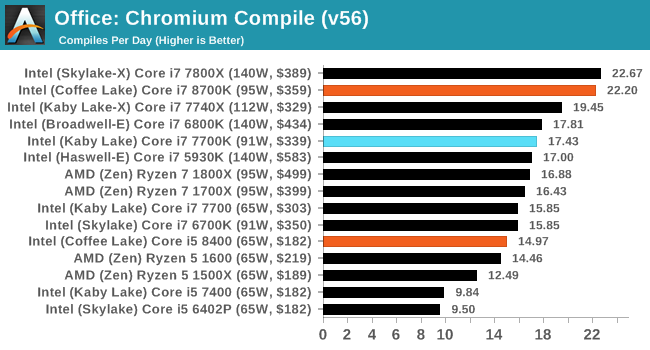
For our compile test, it would appear that the extra memory width afforded by the quad-channel memory of Skylake-X can have a direct benefit in compile performance.
PCMark 10
PCMark 10 is the 2017 update to the family favorite, PCMark 8. PCMark 8 has been part of our test bed since the latest update in Q1. For the most part it runs well, although for some processors it doesn’t recognize, some tests will not complete, leading to holes in our benchmark data (there’s also an odd directory quirk in one test that causes issues). The newest version, PCMark 10, is the answer.
The new test is adapted for more 2016/2017 workflows. With the advent of office applications that perform deeper compute tasks, or the wave of online gamers and streamers, the idea behind PCMark 10 is to give a better ‘single number’ result that can provide a comparable metric between systems. Single metrics never tell the whole story, so we’re glad that Futuremark provides a very detailed breakdown of what goes on.
Ganesh’s article on PCMark 10 goes into more detail than I will here, but the ‘Extended Benchmark’ runs through four different sets of tests: Essential, Productivity, Creation and Gaming. Each of these have sub-test results as well, including startup performance, web performance, video conferencing, photo/video editing, spreadsheets, rendering, and physics, which you can find in Bench.
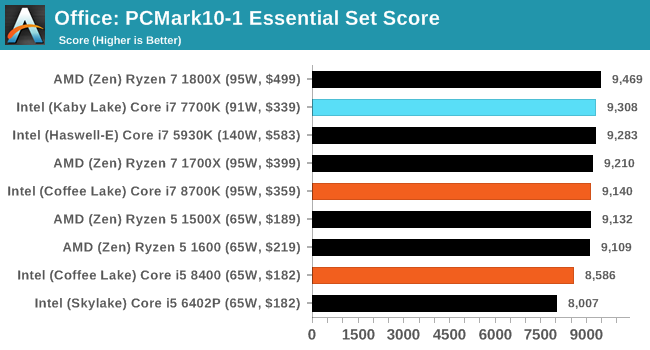
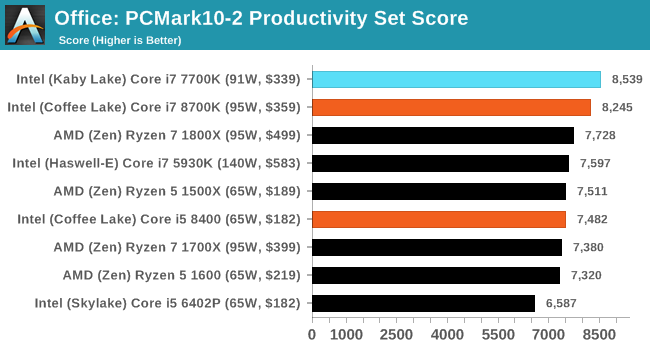
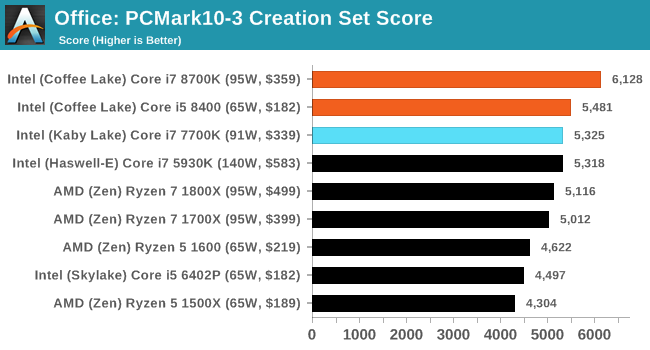
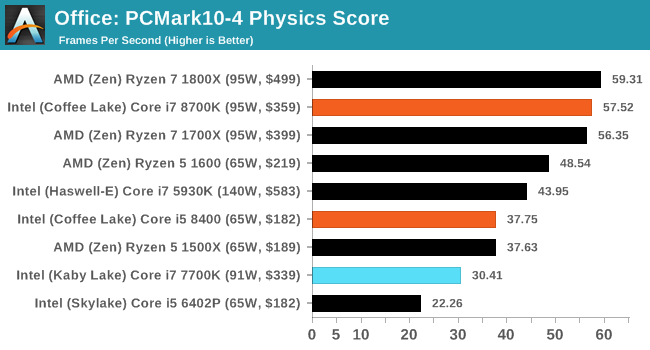
PCMark8: link
Despite originally coming out in 2008/2009, Futuremark has maintained PCMark8 to remain relevant in 2017. On the scale of complicated tasks, PCMark focuses more on the low-to-mid range of professional workloads, making it a good indicator for what people consider 'office' work. We run the benchmark from the commandline in 'conventional' mode, meaning C++ over OpenCL, to remove the graphics card from the equation and focus purely on the CPU. PCMark8 offers Home, Work and Creative workloads, with some software tests shared and others unique to each benchmark set.
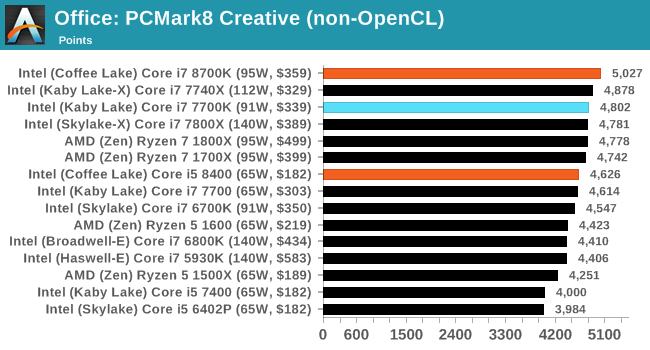
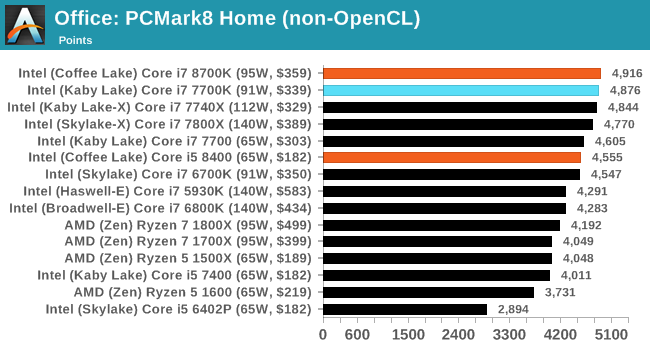
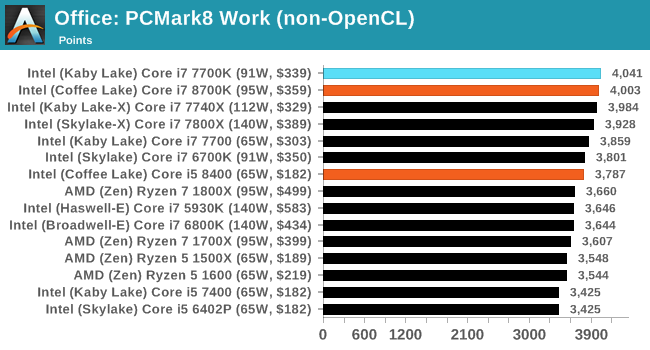










222 Comments
View All Comments
madwolfa - Thursday, October 5, 2017 - link
How in the world 8400 is so significantly faster than 7700K/8700K in all ROTR 1080p benchmarks?neo_1221 - Thursday, October 5, 2017 - link
Maybe resource contention on the hyper-threaded parts? It is odd, but I'm very impressed with that 8400. For most workloads it easily hangs out with the $300+ CPUs.risa2000 - Friday, October 6, 2017 - link
Not only RoTR but also in GTAV. I hope there is an explanation the guys at AT will figure out. If it was the congestion of the threads (as suggested above) then all Ryzen chips should be even worse, but they are not.mapesdhs - Friday, October 6, 2017 - link
According to Ian, RoTR has pure quad-core optimisations present in the engine.nsaklas - Thursday, October 5, 2017 - link
Good info Ian, thank you. Am I the only one who's terribly disappointed by this release?! I've been holding out for this moment to upgrade and what I can gather from the benchmarks is that this will have no noticeable improvement on performance for most applications vs. the last 2 gen's of CPUs....xyvyx2 - Friday, October 6, 2017 - link
yeah.. when I saw these numbers, I figured I'd go back to waiting for 10nm or Ryzen 2. But Techreport's comparison a) used a 1080ti, which I also have b) included my current cpu, the 4790k. The results were far more pronounced and closer to what I'd hoped...I'm mostly baffled by the i5-8400... if it's just 6 cores and it did so much better than the 8700k at a lower turbo clock, on those thread-crippled games, would the new i7 have done better with HT disabled? Would it run cooler with only 6 threads?
limitedaccess - Thursday, October 5, 2017 - link
I'm wondering if you can provide information on what the uncore speeds are for the various Coffeelake SKUs?limitedaccess - Thursday, October 5, 2017 - link
For example would the 8700 and 8700k possibly differ in uncore speed?Ian Cutress - Saturday, October 7, 2017 - link
Usually not, though Intel doesn't provide this information for all the chips in the stack for various (unfathomable) reasons. We've asked before.mapesdhs - Tuesday, October 10, 2017 - link
Is it possible to use cache snooping and other methods to work out uncore speeds?